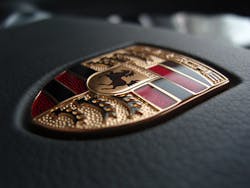Porsche First German Carmaker to Abandon Diesel Engines
Sports car maker Porsche said on Sept. 23 that it would become the first German auto giant to abandon the diesel engine, reacting to parent company Volkswagen's emissions cheating scandal and urban driving bans.
"There won't be any Porsche diesels in the future," CEO Oliver Blume told the newspaper Bild am Sonntag.
Instead, the luxury sports car brand would concentrate on what he called its core strength, "powerful petrol, hybrid and, from 2019, purely electric vehicles".
The Porsche chief conceded the step was a result of the three-year-old "dieselgate" scandal at auto giant Volkswagen.
VW in 2015 admitted to U.S. regulators to having installed so-called "defeat devices" in 11 million cars worldwide to dupe emissions tests and obscure its much higher emissions on the road.
It has so far paid out more than 27 billion euros in fines, vehicle buybacks, recalls and legal costs and remains mired in legal woes at home and abroad.
Diesel car sales have dropped sharply as several German cities have banned them to bring down air pollution -- a trend that Chancellor Angela Merkel was due to discuss with car company chiefs in Berlin later Sunday.
"The diesel crisis has caused us a lot of trouble," Blume said, months after Germany's Federal Transport Authority ordered the recall of nearly 60,000 Porsche SUVs in Europe.
City Driving Bans
Stuttgart-based Porsche in February stopped taking orders for diesel models, which it had sold for nearly a decade.
Blume said Porsche had "never developed and produced diesel engines, having used Audi motors, yet the image of the brand had suffered.
He promised that the company would keep servicing diesel models on the road now.
Blume also defended diesel as a viable technology, which the broader VW group plans to keep using.
"I think modern diesel engines are highly attractive and environmentally friendly," he said. "They will continue to be of great importance to the auto industry in the future."
However, he added, "for us as a sports car manufacturer, where the diesel has traditionally played a subordinate role, we believe that we can do without diesel in the future."
According to the paper, Porsche also faces new claims of having manipulated engines to produce a more powerful sound with a technique that was deactivated during testing.
Blume acknowledged that German regulators had pointed to irregularities in the 8-cylinder Cayenne EU5, affecting some 13,500 units.
The fallout from dieselgate has been wide ranging for Germany and its auto sector which employs some 800,000 people.
Courts are increasingly pressuring German cities to clean up their air, with a diesel ban on two major roads in Hamburg and city-wide exclusion zones for older vehicles coming into Stuttgart and Frankfurt to reduce harmful nitrogen oxides (NOx) emissions.
Consumers have reacted to the prospect of more bans by shunning diesel vehicles, sending its share of the new car market plunging from 46.5% in August 2015 to 32.6% last month.
The EU has meanwhile toughened emissions testing and car companies hope a flood of new battery-powered vehicles will help meet tighter fleet-wide CO2 targets that bite from 2021.
The German government hopes to see one million fully electric and hybrid vehicles on the road by 2022, up from fewer than 100,000 at the start of this year.
Blume said that the matching infrastructure was emerging, telling Bild that by late 2019, some 400 electric charging stations along European highways would allow drivers of battery-powered cars to "get across all of Europe."
By Frank Zeller
Copyright Agence France-Presse, 2018
About the Author
Agence France-Presse
Copyright Agence France-Presse, 2002-2025. AFP text, photos, graphics and logos shall not be reproduced, published, broadcast, rewritten for broadcast or publication or redistributed directly or indirectly in any medium. AFP shall not be held liable for any delays, inaccuracies, errors or omissions in any AFP content, or for any actions taken in consequence.
